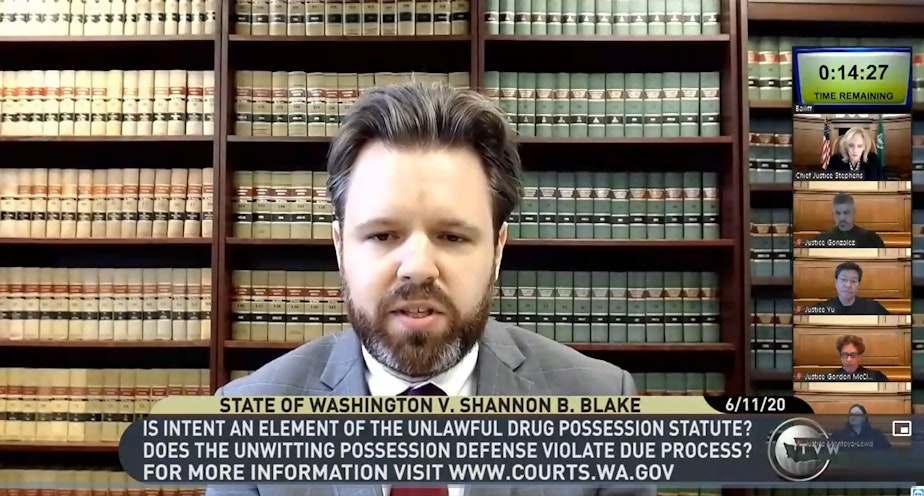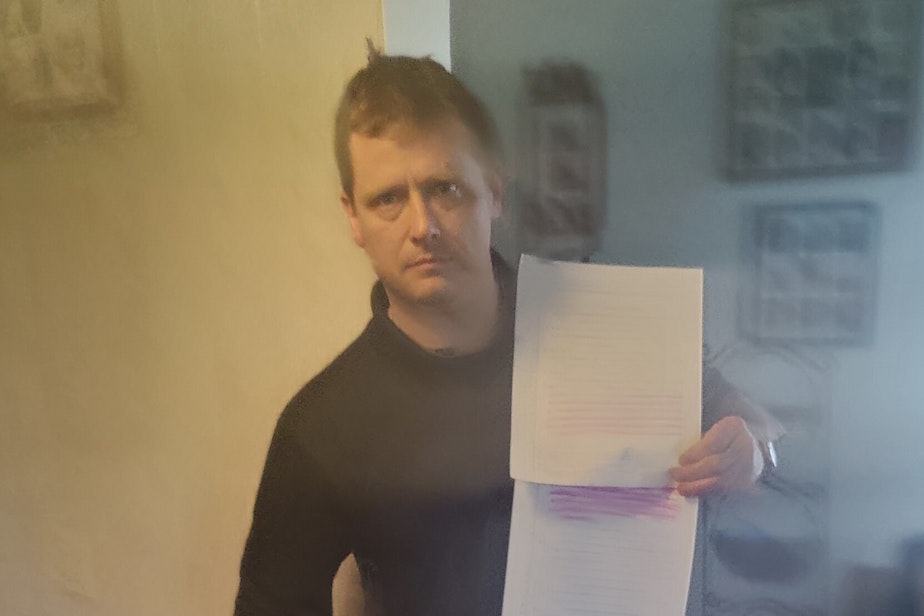In wake of 'Blake,' Washington courts clear drug convictions and refund fines

People convicted under Washington’s longtime felony drug possession law are starting to get their records cleared, and their court-imposed fines refunded. It’s a consequence of the Washington Supreme Court’s groundbreaking decision to strike down the law in February 2021. But the remedy so far has been complicated, as each county sets its own course.
In “State v. Blake,” the Washington Supreme Court found the state’s ban on simple drug possession to be unconstitutional. That’s because it didn’t require proof that a person knowingly possessed illegal drugs. The ruling had immediate impacts – police officers stopped arresting people for drug possession, and prosecutors had people released from jail that day.
The more massive task underway now is to clear five decades of past convictions, re-sentence people already in custody for other violations, and refund the fines paid by people convicted under that law.
In King County, prosecutors say they’ve created a legal assembly line to address these cases as quickly as possible.
“This is happening whether you ask us to or not, it’s happening," senior attorney Laura Petregal said. "We’re doing it.”
Prosecutors are seeking judicial orders on their own, without any action by those convicted, working backward from the most recent cases. So, if you check your court file, it may show that a judge in King County Superior Court has already ordered your conviction to be vacated.
Sponsored
“We are going through and proactively dismissing those cases, and it’s not as simple as pushing a button, right?” Petregal said.
The next step is often to verify how much each person paid in fines. At that point, the person must apply to the clerk’s office for a refund and provide their current address.
“We’ve had people come into the clerk’s office and apply for the refunds that the court order made them eligible for," said David Hackett, a senior civil deputy with the prosecutor’s office. "And King County has issued checks for $77,342.44 over a total of 176 cases.”
There are a lot more to go. Hackett estimates that there may be up to 150,000 eligible convictions going back to 1971 statewide, with 54,000 of them in King County. He said the process will be even more difficult when they get beyond the electronic court record, and have to confirm older convictions on microfiche.
But Hackett said he knows that clearing these records will make a significant difference in people’s lives.
Sponsored
“An individual who’s applying for a job, or who’s applying for housing, or other important things dealing with life, can truthfully answer that they have never been convicted of a simple drug possession offense,” he said.

Hackett said King County has fewer recent cases since prosecutors have de-emphasized charging people with felony drug possession over the past decade. So, he said, their contact information is less up to date for the people affected by the Blake ruling. That’s one reason prosecutors are seeking to proactively clear convictions without notifying those affected.
Benton County in south-central Washington has a larger number of more recent drug possession cases and has taken a different approach. Chief Deputy Prosecutor Ryan Brown said his office sent letters to people with qualifying convictions under “Blake.” Those people were referred to a website where they could seek to have their records cleared and their fines refunded. Benton County has issued $1.5 million in refunds so far.
(This spring the state Legislature provided funding for counties to implement the process and issue the checks.)
Sponsored
By the end of March, King County had vacated 5,040 convictions. Pierce County has vacated 3,777, according to prosecutors. Each county is now establishing its own process.
Pierce County resident Matthew Seed said he’s had major frustrations with obtaining his refund for fines paid to Pierce County. Seed said both Thurston and Pierce counties vacated his 15-year-old convictions this past February. And Thurston County issued his $1,200 refund shortly afterward. But Pierce County has yet to refund his $1,528 in fines.
Seed said he’s made repeated calls to the clerk’s office, which administers the refunds, but hasn’t been able to get any clarification on the timeline.
“I feel like if I don’t continue to be the squeaky wheel and say something, I’m just going to get forgotten about with this,” he said.
Seed said he’s been sober for five years. He said he needs the refund to pay for more reliable transportation to his job.
Sponsored
“I bought a truck from somebody that wasn’t running when I got it. My car had broken down. I fixed it and I just want to license it,” he said.
The Pierce County Clerk’s Office responded that they have now issued Seed’s refund, as part of refunds totaling $177,091.57 so far. They said their refunds were sent later than some other counties because Pierce County waited for state funding to offset those payments.
Seed said he’s glad for the Blake ruling. But he said the harm created by his convictions and fines far exceeded the relief he’s getting now.
“They garnished my wages to get the money,” he said, “and charged me to do that! Not only that, but I’ve been denied jobs because I didn’t pass a criminal background check, several times.”
Prachi Dave is policy and advocacy director at The Public Defender Association, which filed a class-action lawsuit to seek refunds for people statewide. She said the fact that each county has its own process and timing for issuing the refunds is causing confusion.
Sponsored
“We continue to hear that, and I think it’s a result of the fact that this is a very patchwork system,” she said. Dave said the burden on people to get their record cleared and seek their refunds is another variable.
“That’s a lot of work for people who already have a great deal on their plate,” she said. “That’s going to be hard, and these processes are not necessarily easy to navigate right now.”
There is a more uniform process coming – eventually the state’s Administrative Office of the Courts will become a central clearinghouse to address the convictions and deliver refunds, but that isn’t scheduled to happen until the summer of 2023.
Meanwhile, the state is still trying to figure out whether to penalize drug possession at all. After the “Blake” decision, legislators made simple drug possession a misdemeanor offense, with an emphasis on alternatives to criminal charges. But that law is also set to expire next summer.




